Experience Japan
Haven't you always wanted to go to Japan? Haven't you always wanted to find out what the in-jokes and references are in Japanese Animation? Have you been fascinated with old Japanese traditions, culture, its modern technology and economical growth? Has the unfamiliarity with the culture and high cost deterred you from pursuing your dreams?
Well, here is the chance to see how life is like in Japan with your own eyes by living with a Japanese family, interacting with Japanese people, and visiting various historical and cultural sites, all at an exceptionally low cost.
Based upon the close relationship we have developed with an institution in Japan, Ooka Gakuen, through our Japanese Language and Culture program at Evergreen, we are able to offer a 3-week Summer program in Japan this year. While living with a family, you will participate in various cultural workshops and field trips, as well as learning Japanese language in class. The setting of Toyooka is ideal, sitting near the Japan Sea coast line, and not far from the ancient capital Kyoto, the town offers best of the both worlds. It boasts a traditional close-knit farming/fishing community, yet many innovative projects and activities that make it a modern city. The details of the program are described below.
For more information please contact Setsuko Tsutsumi at tsutsuse@evergreen.edu
Important Date(s)
May 1: Non-refundable Deposit at the Cashiers, $100 Contact Faculty
Location of the Program
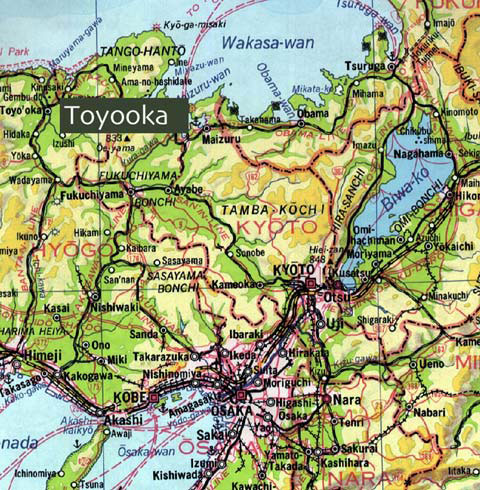
The program will be held in Toyooka city in Hyogo prefecture in Japan. Toyooka city, with a population of 50,000, was traditionally a farming town developed along the Maruyama River, which runs into the Japan Sea. It is now the biggest commercial center in the area with majority of people engaged in the third industries. With the beautiful Japan Sea Coast line to its west, the city is surrounded by rich and diverse landscape from vast ranches, which raise the famous Kobe beef, to forests and mountains, which become a popular ski resort in winter. The area also offers many hot springs, among which the Kinosaki hot springs is best known nationally for its unique city plan and bath houses. In season, their inns are filled with guests from Tokyo and Osaka who come for the taste of the crabs from the Japan Sea.
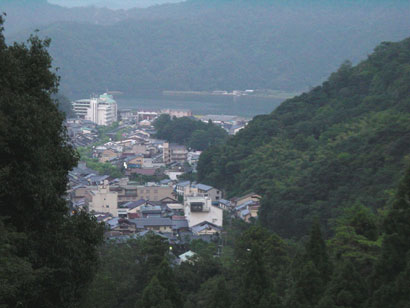
For the past 20 years, the city has been making efforts to bring wild storks back to their fields. Storks play an important role in ecological cycle of rice agriculture there but had become extinct due to various environmental pollutants. Everyone in the city, from the young to the old, from farmers to city officials, are involved in the project and they are now enjoying the rewarding results: More than 100 storks are now living in their fields. The storks became a symbol of the city and celebration of people's efforts to improve the natural environment, to bring the ecological cycle back in their life, and the renewed awareness of local mountains, forests, streams, birds, and rice paddies.

Near to Toyooka is the old city of Izushi, a traditional town with some fine old shrines and castle ruins, as well as many traditional Japanese products, especially ceramics and Izushi soba.
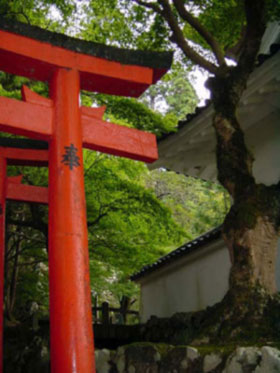
Hosting Institution in Japan
Ooka Gakuen has been hosting our students every year since 2003….Their minute care for each student and genuine kindness to better serve the needs of our students have been deeply appreciated. Owing to their hard work and personal care for each of our student, the programs have been great successes. In fact, many students in the programs still keep. We also receive some visitors from Toyooka every year.
Athletic fields at Ooka Gakuen. Ichiro once played here!
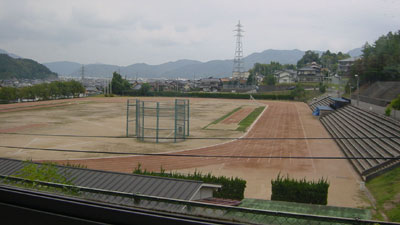
Ooka Gakuen hosted our Japanese Language and Culture program in 2003 for 4 weeks. Their minute care for each student and genuine kindness to better serve our needs were deeply appreciated by everyone in the program. They also worked hard not only to find host families for each student but also to make the experience enjoyable as much as possible for both students and families. Owing to their hard work, flexible, and personal care for each of our student, the program was a great success and everyone had memorable and unique experiences in learning about Japanese culture and people. In fact, many students in the program still keep their communications with the people in the city and some went back to teach English at Ooka Gakuen.
Below is the classroom building where language classrooms, computer facilities, student lounge, and restaurant are located.
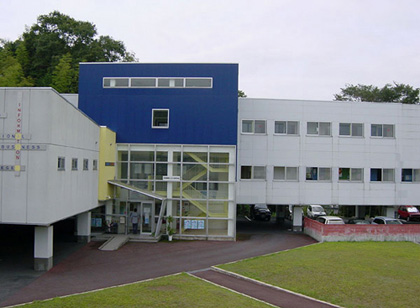
The Lunchroom at Ooka Gakuen. The menu lists common lunchtime offerings, including rice pilaf ($2.25), udon or ramen ($2), and spaghetti ($2).
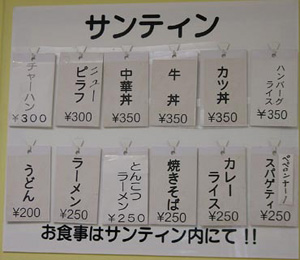
Ooka Gakuen's kuma "bear" bus will be used to provide transportation on field trips to places in the Toyooka area.
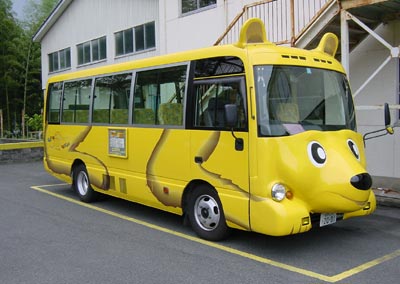
Each participant will be placed in a Japanese family in the area for the duration of the program. Ooka Gakuen will find the most suited family available for each participant based on his/her self-introduction letter which each participant will be asked to submit after the application. All the host-families are ready to welcome you all and looking forward to sharing daily experiences with you. They will prepare you breakfast and dinner, but lunch is up to you.
Class Schedule
Classes in Japan
Japanese Language: Grammar, Reading, and Conversation.
Examples of Cultural Workshops: Calligraphy, Pottery, Tea Ceremony, and Koto music.
Examples of Field Trips:
1. Introduction to Geography of Toyooka: Maruyama River, Japan Sea Coast,
Genbudo, and different farms.
2. Birds Sanctuary (Storks)
3. Izushi Castle Town
4. Kinosaki Hot Spring Resort
5. A Buddhist Temple
6. Day Care Centers
7. Mayor's Office, Police Department, and Fire Department.
Estimated Cost
(subject to change)
Airfare: Seattle to Kansai International Airport, $1,000
Domestic Transportation: $120
Lunch: $120
Field Trips: $60
Gratitude to Host Families: $300
To Ooka Gakuen: $400
Contingency: $500
Total: $2,500
Credit Requirements
1. To Participate in All the Language Classes, Workshops, and Field Trips.
Attend and fully participate in all the language sessions, cultural workshops, and field trips.
Joining in courtesy visits to the Mayor's office, City Fire Department, and City Police Department is also
required. These are not political or diplomatic visits but integral parts of the program since
those offices are cores of the close-knit society and play a leading role in their community
wide effort to host us. You will learn in turn from the visits how the city works as a community
and helps each other, as well as getting valuable information about the city.
2. To Participate in Family life at a Host Family
In order to make your experiences in Toyooka successful, it is very crucial to participate in
daily activities at your host family as fully and actively as possible. Become a new member of
the family and interact with them and share the household chores. The key to the successful home
stay experience is to be open-minded and flexible with your new environments. More detailed
guidelines for home stay will be given at the campus orientations.
3. To Keep a Journal
Keep a journal of your observations and experiences in a newly introduced culture. Be a good
observer and jot down your findings and thoughts with your collections of "interesting" things
in Japanese life, such as various wrapping papers, train tickets, stamps, advertisements, or funny
"Japanese English," etc. You will be creating valuable and meaningful records of your experiences.
4. Research Project: Observation Portfolio.
Based on your journal,
compile an observation portfolio. Organize the observations according to several categories,
such as family life, children's education, relationships among family members, rites of passage,
religious practices, and city plans. Portfolio should be illustrated with photos and other
materials. The portfolio will create not only a precious record of your memories but also a
valuable anthropological record of people and their life in a local town n Japan.
Expected Credit Equivalencies:
3 - Japanese Language
2 - Japanese culture and society
3 - Individual Research Project
Total: 8
Important Preparations You Have to Start Now
1. Valid Passport
Make sure that you have a valid passport. If it is expired or if you don't have one at all,
apply now at the nearest post office with your birth certificate and photos. It will take more
than one month to get one mailed back to you.
2. Your Health Insurance
Make sure that you have a health insurance, which will cover your illness and accidents
while you are in Japan. Bring the information such as the name of the insurance,
your policy number, emergency contact number for the authorization of treatment abroad.
3. Your Self-Introduction Letter
Introduce yourself, either in Japanese or in English, to your host family and Ooka Gakuen in one
or two page letter with your picture attached. Make sure to include your preferences to certain food
and smoking or non-smoking. Include your medical information such as allergic reactions to certain
food if there are any.
4. Non-Refundable Deposit
Make a non-refundable deposit of $100 by May 1 at the Cashier's Office. The deposit will be
used toward airfare.